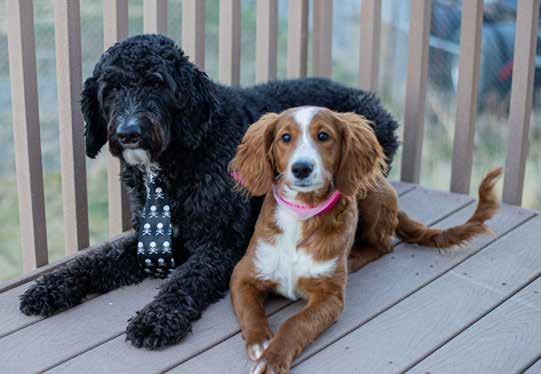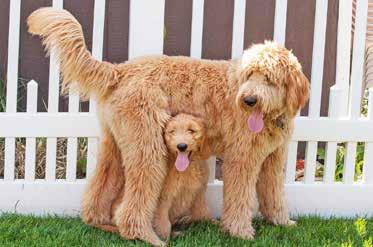
3 minute read
Designer Dogs
Molesley Sirius—a borderdoodle, and Mildred McGonagall —a goldendoodle.
By Connie Lewis
Advertisement
Puppy sales skyrocketed during COVID shutdowns because people who found themselves stuck at home turned to canine companionship. Designer dogs were at the forefront of the adoption frenzy, despite high prices and long wait lists.
Designer dogs are bred from two registered pure dog breeds to optimize the best characteristics of each parent.
Everything from Cockapoos (Cocker
Spaniel and Poodle), Goldendoodles (Golden Retriever and Poodle), to a
Puggle (Beagle and Pug), and more are available. Many breeders use poodles because of their temperaments and intelligence, not to mention they are mostly hypoallergenic. People who are allergic to dog hair but have always wanted a Golden Retriever can fulfill their dreams with a retriever bred to a non-shedding poodle. Angela Bennion breeds Goldendoodles. She fell in love with her brother’s Goldendoodle several years ago when they first became popular. Angela and her husband had always had dogs, but there was something special about the Goldendoodle that inspired her to start breeding them.
Prices charged for these specialty dogs have increased along with their popularity. That led to a lot of unethical breeders who keep their females constantly pregnant and living in poor conditions. One of the hallmarks of
Angela’s business is her ethical treatment of her dogs.
“I really make sure my girls are healthy and happy,” says Angela. On the advice of her veterinarian, she waits until her females are between 18 months to two years old for their first breeding, and will only breed each one a total of four times. “When all is said and done, they’re part of our family,” she added. Besides being adorably hard to resist, Angela says that one of the advantages of a Goldendoodle is the lack of shedding. By breeding to a poodle, you get a dog with hair that needs to be cut rather than falling out, making them perfect for people who don’t want dog hair on their furniture, rugs, and clothing.
When shopping for a new puppy, no matter what breed, it is important to do a little homework. The best possible situation is a visit to the breeder’s home. Angela keeps her moms and puppies in the house, sometimes even sleeping next to them during the night, rather than relegating them to a backyard or storage room. It helps with the puppies’ socialization having them in the busy area of her house. They get used to sounds such as vacuums and kids, and are less easily spooked when they are adopted. Angela describes her dogs as smart and easy to train because they want to please.
She also does early training with the puppies. For example, she starts taking them outside to go to the bathroom at 3½ weeks. “It is a lot of work because I take them all out every time they wake up, but it is worth it.”
All of the work and socialization Angela puts into the puppies before they are adopted pays off for new owners who have a much easier time transitioning to a new puppy in the home.
Angela is very selective about who she allows to purchase her puppies. She wants to make sure the new owners will love her dogs as much as she
does. The puppy contract requires that the owners can’t resell their puppy. If they get into a situation where they can’t keep the dog, Angela will take it back. “I want to make sure the people who buy my pups are committed and I don’t have to worry about the well-being of my puppies.”
The joy of owning a puppy can’t be defined monetarily. The years of joy and companionship they give us are priceless.










